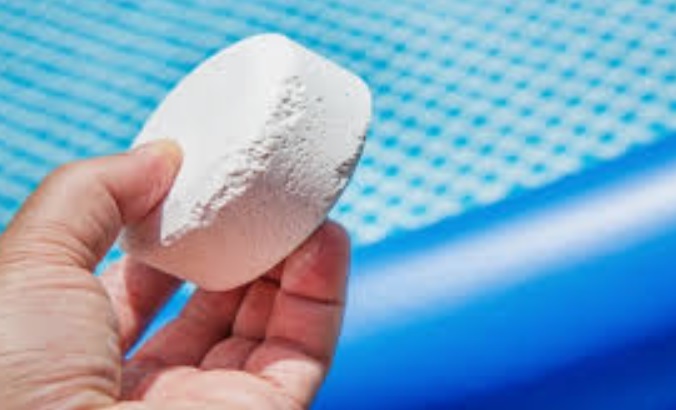Have you ever packed iodine water purification tablets for a trip and wondered if they still work after sitting in your bag for months or even years? You’re not alone.
Knowing whether these tablets expire is crucial for your safety and peace of mind. Using expired tablets could leave you drinking unsafe water, putting your health at risk. You’ll discover how to check if your iodine tablets are still effective, why expiration matters, and what to do if yours are past their prime.
Keep reading to make sure your water stays clean and safe—no matter when you bought those tablets.

Shelf Life Of Iodine Tablets
Iodine water purification tablets help make water safe to drink. People often wonder if these tablets expire and lose effectiveness.
Knowing the shelf life of iodine tablets helps ensure water is properly purified when needed.
Typical Expiration Period
Iodine tablets usually have a shelf life of 3 to 5 years. This depends on how they are stored and the brand.
After the expiration date, tablets may not kill germs as well. It is safer to use tablets before they expire.
Factors Affecting Longevity
Several factors can change how long iodine tablets stay good. Proper storage keeps them effective longer.
- Temperature: Heat can reduce tablet strength.
- Moisture: Humidity may cause tablets to break down.
- Packaging: Sealed containers protect tablets from air and water.
- Light: Exposure to sunlight can lower effectiveness.
How Expiry Affects Effectiveness
Iodine water purification tablets can lose their strength after their expiry date. This means they might not kill germs as well.
Using expired tablets can put your health at risk because the water may not be fully safe to drink.
Chemical Stability Over Time
Iodine tablets have chemicals that break down over time. This change lowers their ability to purify water.
Heat, light, and moisture can speed up this breakdown. Proper storage can help keep tablets stable longer.
- Store tablets in a cool, dry place
- Keep tablets away from direct sunlight
- Use sealed containers to prevent moisture
Impact On Water Purification
Expired iodine tablets may not kill all harmful bacteria and viruses. This reduces water safety.
Using fresh tablets ensures water is disinfected properly. Old tablets might leave water unsafe to drink.
Storage Tips For Maximum Potency
Iodine water purification tablets are useful for safe drinking water. Keeping them fresh helps maintain their strength.
Proper storage can extend the life of these tablets. Follow simple tips to keep them effective for longer.
Ideal Environmental Conditions
Store iodine tablets in a cool, dry place. Heat and moisture lower their potency quickly.
Avoid storing tablets in direct sunlight. Light can break down the active ingredients.
- Keep tablets below 77°F (25°C)
- Store in a dry area with low humidity
- Protect from sunlight and bright light
Packaging And Handling
Keep tablets in their original sealed packaging. It protects them from air and moisture.
Open packages only when ready to use. Handle tablets with clean, dry hands to avoid contamination.
- Use airtight containers if repackaging
- Seal opened packages tightly
- Avoid touching tablets directly
Signs Tablets Have Expired
Iodine water purification tablets are useful for making water safe to drink. Over time, these tablets can lose their effectiveness. It is important to know the signs that show tablets have expired.
Using expired tablets may not fully clean your water. Look for changes in the tablets before using them.
Visual And Physical Changes
Expired iodine tablets often look different. They may change color or texture. Sometimes, tablets become soft or crumble easily.
- Color shifts from original shade to faded or darkened
- Tablets appear cracked or broken
- Surface feels powdery or chalky
- Hardness decreases, tablets break apart
These changes happen because the chemicals break down over time. If you see any of these signs, do not use the tablets.
Loss Of Disinfecting Power
Expired tablets may not kill germs effectively. The iodine content reduces as the tablets age. This lowers their ability to purify water.
Using tablets past their expiration date can leave water unsafe. The risk of illness increases if the tablets lose strength.
- Longer time needed to disinfect water
- Possible survival of harmful bacteria and viruses
- Reduced iodine smell or taste in treated water
- Inconsistent purification results
Safe Usage Of Expired Tablets
Iodine water purification tablets help kill harmful germs in water. People often wonder if expired tablets are still safe to use.
This guide explains how to use expired iodine tablets safely and what risks to watch for.
Potential Health Risks
Expired iodine tablets may lose their strength. This means they might not kill all bacteria or viruses in water.
Using weak tablets can cause sickness from unsafe water. Also, chemicals in old tablets might change and cause side effects.
- Risk of waterborne diseases
- Possible stomach upset or irritation
- Reduced effectiveness in killing germs
When To Avoid Using Them
Do not use iodine tablets if they look damaged or smell strange. Also avoid tablets past a long expiry time.
Avoid using expired tablets when you rely on water for drinking or cooking, especially in risky areas.
- Tablets with changed color or texture
- Tablets expired more than one year ago
- When clean water is not available as backup
- For people with iodine allergies or thyroid issues

Credit: www.amazon.ae
Alternatives To Iodine Purification
Iodine water purification tablets help clean water but they can expire. It is good to know other ways to purify water. Some alternatives may work better for your needs.
This guide covers other chemical treatments and mechanical water filters. These methods help make water safe to drink without iodine.
Other Chemical Treatments
Besides iodine, several chemical treatments remove germs from water. These include chlorine and chlorine dioxide tablets. They kill bacteria and viruses effectively.
Some people use bleach drops or liquid chlorine carefully. It is important to use the right amount to avoid taste or health issues.
- Chlorine tablets work fast and are easy to carry
- Chlorine dioxide kills resistant germs
- Bleach can be used but needs precise dosing
- All chemicals need time to work before drinking
Mechanical Water Filters
Mechanical water filters remove dirt, bacteria, and protozoa by physically blocking them. They do not use chemicals but filter water through small pores.
Filters come in many forms, such as pump filters, straw filters, and gravity filters. They are reusable and work well for clear water sources.
- Pump filters push water through a filter cartridge
- Straw filters allow drinking directly from water
- Gravity filters use gravity to pull water through
- Filters need cleaning or replacement after use

Credit: trueprepper.com
Frequently Asked Questions
Do Iodine Tablets For Water Purification Expire?
Yes, iodine water purification tablets do expire. Typically, they have a shelf life of around 4 to 5 years. Always check the expiration date on the packaging before use. Expired tablets may not effectively purify water, posing a risk to your health.
How To Store Iodine Purification Tablets?
Store iodine tablets in a cool, dry place away from sunlight. Exposure to heat and moisture can degrade their effectiveness. Keeping them in an airtight container can extend their lifespan. Always ensure the packaging is sealed properly after use to maintain their potency.
Can Expired Iodine Tablets Be Used Safely?
Using expired iodine tablets is not recommended. Their effectiveness diminishes after the expiration date. This may lead to inadequate water purification, increasing the risk of waterborne diseases. Always replace expired tablets to ensure safe drinking water.
What Are Signs Of Expired Iodine Tablets?
Signs of expired iodine tablets include a change in color or odor. They may also crumble easily when handled. If you notice these signs, it’s best to dispose of them and use a fresh batch to ensure safe water purification.
Conclusion
Iodine water purification tablets do expire over time. Their effectiveness drops after the expiration date. Using expired tablets may not clean water properly. Always check the date before use. Store tablets in a cool, dry place. Fresh tablets ensure safe and clean drinking water.
Keep them handy for emergencies and travel. Remember, safe water means better health for you. Choose wisely and stay prepared.

